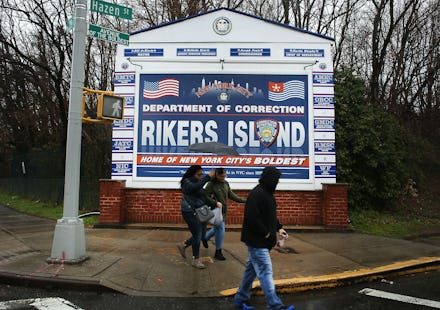Coronavirus arrives at Rikers, sparking calls for better jail protections

Coronavirus, like most other diseases, disproportionately harms those lacking essential resources and the available means to acquire them. That extends to people in jail, who are often housed in tight quarters and lacking the basic hygiene supplies that are crucial when an outbreak like the coronavirus pandemic is spreading. Now, perhaps one of the most notorious prisons in the country, Rikers Island — a collection of 10 New York jails that houses 10,000 people on any given day — has reported that an officer and an incarcerated person on the island have tested positive for coronavirus. The test results come after activists have put mounting pressure on officials to release incarcerated people from New York City jails.
“It’s essential to the welfare of all people in the jails that facilities are well equipped and that all people have ready access to maintain their personal hygiene, including immediate ability to wash their hands with soap and water,” a letter to the New York City Board of Correction from the Brooklyn Defender Services reads. Around 8,000 people are held in pretrial detention alone, with just over half of those people simply unable to post bail.
Rikers Island, as The Intercept reported, isn’t providing soap to incarcerated people, and officers have reportedly instructed people to purchase their own soap. Those incarcerated at Rikers Island are also sleeping with up to 100 people in a room; social distancing instructions, even if they had reached people in the jail, could likely not be followed. Meanwhile, New York State is using prison labor to produce state-branded hand sanitizer for the state of New York, despite the fact that many inmates are unable to use it themselves due to prison rules on alcohol-based substances.
“People confined in jails during outbreaks of infectious disease are particularly vulnerable not only because of the physical environment, including poor ventilation and close proximity,” a letter from the Legal Aid Society to the New York City Board of Correction said, “but also because of the profound constraints on self-help imposed by the coercive power of incarceration.”
A presentation from the Department of Correction, which contained nine slides in total, discussed the measures New York City jails were taking to educate those who are incarcerated about the spread of coronavirus, including getting a flu shot (there is no coronavirus vaccine), washing your hands, and covering your coughs. But a leaked internal document to Department of Correction employees states in their “pandemic plan” that officers will not be required to wear masks, which advocates say is concerning given that employees leave jail and go back to their New York City homes, where the virus is spreading at an alarming rate.
As a response to calls for self-isolation measures, the document also states that “inmates in dormitory housing areas will be instructed to sleep head to toe thereby increasing the breathable space between inmates.” And while a presentation to the city said facilities would be cleaned daily, it failed to mention that incarcerated folks will be doing the cleaning.
New Yorkers voted in 2017 to close Rikers Island, in recognition of the racism that supports the prison and jail systems; most of those incarcerated at Rikers are Black and brown. New York City Mayor Bill de Blasio (D) has yet to make a statement about releasing high-risk individuals currently incarcerated at Rikers.